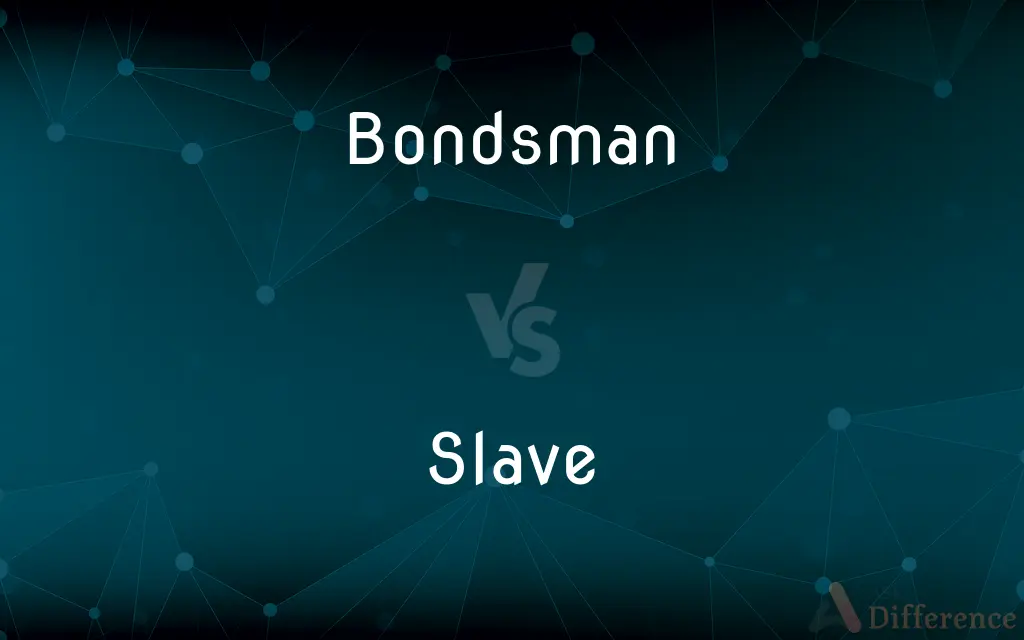Bondsman vs. Slave — What's the Difference?
By Tayyaba Rehman & Urooj Arif — Updated on April 21, 2024
Bondsman refers to a surety or someone who pledges bail for another, while a slave is a person owned by another and compelled to provide unpaid labor.

Difference Between Bondsman and Slave
Table of Contents
ADVERTISEMENT
Key Differences
A bondsman is typically involved in legal and financial contexts, especially in securing someone’s release from jail through bail bonds, whereas a slave is forced into servitude without freedom or personal rights.
In historical contexts, a bondsman might have been someone bound to service without wages through indentured servitude, on the other hand, a slave was legally considered property of the owner, with no rights to wages or self-autonomy.
Bondsmen operate within a legal framework where their roles and rights are defined by law; conversely, slaves historically existed under a system that legally denied them basic human rights and treated them as commodities.
The term bondsman today often relates to bail bond agents who provide a financial guarantee to a court that a defendant will appear for trial, while slavery is universally illegal and recognized as a violation of human rights.
While a bondsman’s relationship with clients is professional and contractual, the relationship between a slave and their owner was ownership-based and coercive, without any personal freedoms or legal protections for the slave.
ADVERTISEMENT
Comparison Chart
Definition
A person or agent who provides bail for another.
A person who is the legal property of another and is forced to obey them.
Legal status
Operates legally within the judicial system.
Historically legal, now universally illegal.
Rights
Has legal rights and operates under contract.
Had no personal rights or freedoms.
Payment
Receives payment for services.
Receives no payment; forced to work.
Historical Role
May also refer to indentured servants.
Considered property, not employees or servants.
Compare with Definitions
Bondsman
Indentured servant (historical).
The bondsman worked to pay off his passage to America.
Slave
Captive worker.
As a slave, she was forced to work from dawn until dusk.
Bondsman
Surety provider.
As a bondsman, he guaranteed the appearance of the individual in court.
Slave
Unpaid laborer.
The slave’s entire family was in bondage, working unpaid.
Bondsman
Legal financial helper.
Hiring a bondsman can reduce the financial burden during a trial.
Slave
Person owned by another.
The slave worked on the cotton fields without pay.
Bondsman
Bail bond agent.
The bondsman operates his business near the courthouse.
Slave
Deprived of freedom.
The slave had no freedom to leave or refuse work.
Bondsman
Agent who provides bail.
The bondsman arranged bail for the defendant overnight.
Slave
Subject to ownership.
Historical documents list the names of slaves as property.
Bondsman
A person who provides bond or surety for another.
Slave
One who is owned as the property of someone else, especially in involuntary servitude.
Bondsman
A male bondservant.
Slave
One who is subservient to or controlled by another
His boss's slave.
Bondsman
A male slave.
Slave
One who is subject to or controlled by a specified influence
A slave to alcohol.
A slave to an irrational fear.
Bondsman
A male indentured servant.
Slave
One who works extremely hard.
Bondsman
Someone who signs a bond that states that they have taken responsibility for someone else's obligations.
Slave
One who acts out the role of the submissive partner in a sadomasochistic relationship.
Bondsman
A slave; a villain; a serf; a bondman.
Carnal, greedy people, without such a precept, would have no mercy upon their poor bondsmen.
Slave
A slave ant.
Bondsman
A surety; one who is bound, or who gives security, for another.
Slave
A machine or component controlled by another machine or component.
Bondsman
A male slave
Slave
To work very hard or doggedly; toil.
Bondsman
Someone who signs a bond as surety for someone else
Slave
To trade in or transport slaves.
Bondsman
A male bound to serve without wages
Slave
To cause a machine or component to be controlled by another machine or component.
Slave
A person who is held in servitude as the property of another person, and whose labor (and often also whose body and life) is subject to the owner's volition and control.
Slave
(figuratively) A drudge; one who labors or is obliged (e.g. by prior contract) to labor like a slave with limited rights, e.g. an indentured servant.
Slave
(figuratively) An abject person.
Slave
(figuratively) One who has no power of resistance (to something), one who surrenders to or is under the domination (of something).
A slave to passion, to strong drink, or to ambition
Slave
(BDSM) A submissive partner in a BDSM relationship who (consensually) submits to (sexually and/or personally) serving one or more masters or mistresses.
Slave
A sex slave, a person who is forced against their will to perform, for another person or group, sexual acts on a regular or continuing basis.
Slave
A device (such as a secondary flash or hard drive) that is subject to the control of another (a master).
Slave
To work as a slaver, to enslave people.
Slave
(intransitive) To work hard.
I was slaving all day over a hot stove.
Slave
(transitive) To place a device under the control of another.
To slave a hard disk
Slave
See Slav.
Slave
A person who is held in bondage to another; one who is wholly subject to the will of another; one who is held as a chattel; one who has no freedom of action, but whose person and services are wholly under the control of another.
Art thou our slave,Our captive, at the public mill our drudge?
Slave
One who has lost the power of resistance; one who surrenders himself to any power whatever; as, a slave to passion, to lust, to strong drink, to ambition.
Slave
A drudge; one who labors like a slave.
Slave
An abject person; a wretch.
Slave
To drudge; to toil; to labor as a slave.
Slave
To enslave.
Slave
A person who is owned by someone
Slave
Someone who works as hard as a slave
Slave
Someone entirely dominated by some influence or person;
A slave to fashion
A slave to cocaine
His mother was his abject slave
Slave
Work very hard, like a slave
Slave
Held in servitude;
He was born of slave parents
Common Curiosities
Are bondsmen legal?
Yes, bondsmen operate legally within the judicial system to provide bail services.
Is slavery legal anywhere in the world today?
No, slavery is illegal in every country today, though illegal practices still exist.
What does a bondsman charge for their services?
Bondsmen typically charge a non-refundable fee, usually 10% of the bail amount.
Who is considered a slave?
A slave is an individual who is owned by someone else, without personal freedom or rights.
Can a bondsman refuse service?
Yes, bondsmen can choose not to provide bail based on risk assessment.
Did slaves have any legal rights historically?
Historically, slaves had no legal rights and were treated as property.
What happens if someone bailed out by a bondsman does not appear in court?
The bondsman may lose the bail money paid to the court and can legally seek recovery from the individual.
What is a bondsman?
A bondsman is a person or business that provides bail money to individuals under judicial supervision.
Can slaves earn wages?
Traditionally, slaves could not earn wages as they were considered property.
How do bondsmen make money?
Bondsmen earn money by charging fees for the bail bonds they issue.
What were common tasks for slaves?
Slaves were often forced into hard labor such as farming, household work, or in industries like mining.
Share Your Discovery

Previous Comparison
Complex vs. Complexion
Next Comparison
Resined vs. RosinedAuthor Spotlight
Written by
Tayyaba RehmanTayyaba Rehman is a distinguished writer, currently serving as a primary contributor to askdifference.com. As a researcher in semantics and etymology, Tayyaba's passion for the complexity of languages and their distinctions has found a perfect home on the platform. Tayyaba delves into the intricacies of language, distinguishing between commonly confused words and phrases, thereby providing clarity for readers worldwide.
Co-written by
Urooj ArifUrooj is a skilled content writer at Ask Difference, known for her exceptional ability to simplify complex topics into engaging and informative content. With a passion for research and a flair for clear, concise writing, she consistently delivers articles that resonate with our diverse audience.














































